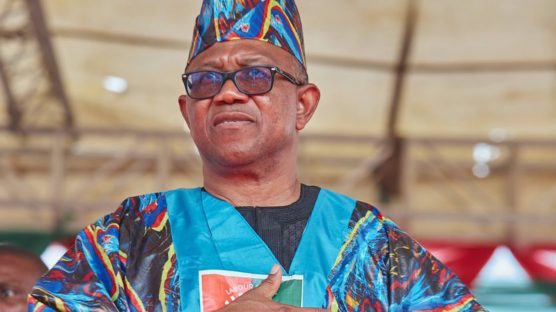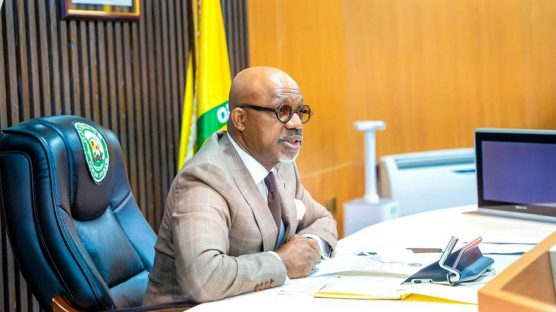12 Mar
Defying voter fatigue and despair presents as the immediate challenges that the wave-making Labour Party (LP) would confront in the coming days.
12 Mar
Ahead of Saturday’s governorship election, the Association of People Living with Disability in Ogun State has endorsed Governor Dapo Abiodun for a second term.
13 Mar
THE inability of many Nigerians to access cash for daily activities is beginning to impact livelihoods and productivity in the real sector negatively, while pushing many businesses in the informal sector to the edge.
Already, employers are witnessing rising cases of absenteeism from members of staff, especially low cadre workers, owing to their inability to access cash for transportation. Factories are also experiencing a reduction in number of shifts and utilisation due to fewer workers and poor product sales at the retail end, while stakeholders in the informal sector have witnessed a decline in activities in the last few weeks.
As many banks’ online platforms and apps continue to fail the stress test, many Nigerians are in a limbo, unable to make necessary transactions in cases where they choose to embrace cashless payments, yet equally unable to access their cash.
Though some state governments are allegedly planning to initiate contempt proceedings against the Attorney-General of the Federation and Minister of Justice, Abubakar Malami, and Governor of the Central Bank of Nigeria (CBN), Godwin Emefiele, over their refusal to implement the Supreme Court judgment on the naira redesign policy of the Federal Government, the organised private sector noted that the economy has lost an estimated N20 trillion since the cash crisis commenced.
The silence of President Muhammadu Buhari on the judgment of the apex court had fuelled the rejection of the old N1,000 and N500 as legal tender, even though sources at the CBN claimed the bank was still sorting the notes. Findings by The Guardian showed that in the last two weeks, the challenges of access to cash have worsened, as banks no longer offer cash to their customers as previously done in small ration before the presidential election. This is just as the Point of Sale (POS) operators, who have continued to bridge the cash gap, are equally constrained by lack of access despite Nigerians offering to pay a premium for available cash.
The Guardian gathered that many Nigerians now depend on offerings from churches and fuel station attendants to have access to cash to meet their daily needs and pay for transport fares to their places of work.
ACCORDING to the Centre for the Promotion of Private Enterprise (CPPE), the N20 trillion losses suffered by the economy arose from the deceleration of economic activities, crippling of trading activities, stifling of the informal economy, contraction in the agricultural sector and paralysis of the rural economy, adding that there are also corresponding job losses in thousands.
CPPE chief executive officer, Dr. Muda Yusuf, noted that Nigerians continue to groan in the adversity inflicted by the acute cash shortage amid rejection of old currency notes by market operators, refusal by banks to accept old notes, silence by the Presidency on the Supreme Court judgment and absence of official pronouncement by CBN on the issue.
He added that retail transactions across sectors have become nerve-wracking and distressing as payment system challenges persist. Yusuf, therefore, called on President Buhari to immediately intervene to put an end to the hardship caused by the currency redesign policy, adding that the cash scarcity has not only crippled economic activities in the country but has now become a major risk to the livelihoods of Nigerians. “Nigerians have not been this traumatized in recent history. The economy is gradually grinding to a halt because of the collapse of payment systems across all platforms. Digital platforms are performing sub-optimally because of congestion; physical cash is unavailable because the CBN has sucked away over 70 per cent of cash in the economy and the expected relief from the supreme court judgment has not materialised,” CPPE said.
A report by purchasing managers index (PMI) equally showed that Nigerian firms recorded a slight loss of growth momentum in January, citing lower demand, issues with machinery and power supply, which dipped to 53.5 in January from 54.6 in December.
The PMI report stated that with CBN’s cashless policy, many businesses are having difficulties in finalising transactions due to poor access to cash and downtime on payment channels.
Already, the situation has affected many organisations as workers’ productivity has nose-dived drastically, thereby affecting output. Many workers in the civil service and some private organisations have remained at home due to lack of transport fare to get to their places of work.
A civil servant with a family of four, at the weekend, told The Guardian how the cash scarcity is affecting him so badly that he could not afford transporting himself to work and back.
According to him, “after explaining my ordeal to the bus operator that I don’t have cash and that I will transfer through my bank app, he agreed. After trying several times with my two banks’ apps, both of them failed me and I made a fool of myself in public. Thank God, he understood my predicament as he allowed me to perform the transaction even after I had alighted. Since then I have remained at home until I can access cash.”
A factory worker, Blessing Akachukwu, who collects N1,300 daily from a 12-hour shift of 7:00a.m. to 7:00p.m., said her organisation no longer pays cash but does transfers bi-weekly.
She said the current situation has drastically reduced her wages, as she has to use the wages to buy money, thereby reducing her take-home.
“I have to do that because if I remain at home, I’ll not be paid. I only get paid on days I go to work. Our employers don’t care how we get to work and the day we don’t come, that day’s payment would be deducted. By the time I deduct the percentage I part with to get cash, remove transportation costs and feeding, there is nothing left. The suffering is just too much,” she lamented.
A supervisor in one of the factories also told The Guardian that the cash crunch has made his firm cancel one of the shifts, thereby, operating two shifts, morning and night.
He said his factory, which produces tomato paste, had reduced the workforce due to its inability to meet demand, rather than running at a loss. He added that low patronage has reduced their production capacity and they had to review the workforce, promising that the organisation would recall them back when the economy bounces back.
President of the Association of Senior Civil Servants of Nigeria (ASCSN), Tommy Okon, who expressed concerns and pain, said the economic advisers to the government have failed in their capacities, which is hurting the informal sector badly.
Okon said if the situation is not urgently addressed, many civil servants would continue to remain at home due to lack of transport fare to get to their places of work.
Also lamenting the current situation are operators in the food and beverages sub-sector, who noted that many consumers are wary of spending available cash on certain items.
Former President of the National Union of Food, Beverage and Tobacco Employees (NUFBTE), Lateef Oyelekan, who said the government was torturing Nigerians with the naira redesign policy, said the sector has lost billions, as most factories have shut down due to low patronage.
He said when workers are not on ground to run the plants, the production capacity will drop and sales will slash down.
“Many workers are not at their duty posts due to lack of transportation, except organisations with staff buses and you know our products have an expiry date, with a shelf life of each food processing at six months. So, if they produce and do not sell, after six months they have to discard it because it has expired. The raw materials also get expired. A lot of money is going down the drain with billions of naira lost. It has not helped the economy,” he said. For businesses in the Micro, Small and Medium Enterprises (MSMEs), Director-General of the Nigeria Employers’ Consultative Association (NECA), Adewale-Smatt Oyerinde, said due to the policy and cash crunch, many of them have crashed and gone into extinction.
“A business that is already on lifeblood, you now squeeze the pipe that is giving it blood and you expect absolute magic. In the informal sector, the volume of cash that is transacted daily could only be imagined. Go to Mile 12 market and other markets and see. It is because those at the top do not feel these things, that this situation has persisted for this long,” he said.
The Deputy General Secretary of the Nigeria Labour Congress (NLC), Chris Onyeka, said the policy was probably a conscious effort to undermine productivity across the nation.
“A government that is seeking ways to enhance productivity and drive economic development and not taking the issue of the cash crunch seriously speaks to the irresponsible way we have run governance in the country. Cash is fluid and when cash is emasculated, the people are emasculated and productivity is also undermined.
“A worker that does not have cash to pay for transport, while waiting for buses that accept transfer or POS, by the time he gets to work very late, he is already tired and frustrated. Such a worker will not be able to focus at work. The moment you sit down to work, you begin to doze off and the next thing you begin to think of is how you are going to get home. All these occupy your mind and you then lose focus,” he said.
A public affairs analyst, Jide Ojo, said the President Buhari-led administration, which promised to create 10 million jobs in 10 years appears to want to take more than five million jobs back before it leaves in May 29, relating it to the naira and fuel scarcity challenges, which has been counter-productive to the economy.
Lamenting the number of lives that have been lost to the cash crunch, he said: “This is counterproductive to our economy because when you compute the manhours people spend to go queue for cash, people now queue at church account departments and fuel stations to look for cash. Many businesses are ready to sell on credit, even as productivity has reduced drastically. Nigerians deserve better.”
You may be interested

Milan Coach Fonseca Faces Sack After Draw Vs Roma
Webby - December 29, 2024Paulo Fonseca seems to have reached an end in his short-lived tenure as Milan’s head coach as he faces sack…
Arsenal To Offer Kiwior In Swap Deal For Super Eagles Star
Webby - December 28, 2024Arsenal are reportedly considering a January move for AC Milan Nigerian international Samuel Chukwueze as Mikel Arteta eyes cover for…

No Club Is Superior To Us –Inter Milan Striker, Thuram
Webby - December 28, 2024Marcus Thuram has said there’s no team superior to Inter Milan as the Serie A giants strike fear into oppositions.The…


















![American Pastor, David Wilson Seen Eating The Box Of Woman Who Isn’t His Wife [Video]](https://onlinenigeria.com/wp-content/uploads/2019/10/american-pastor-david-wilson-seen-eating-the-box-of-woman-who-isnt-his-wife-video-150x150.jpg)








